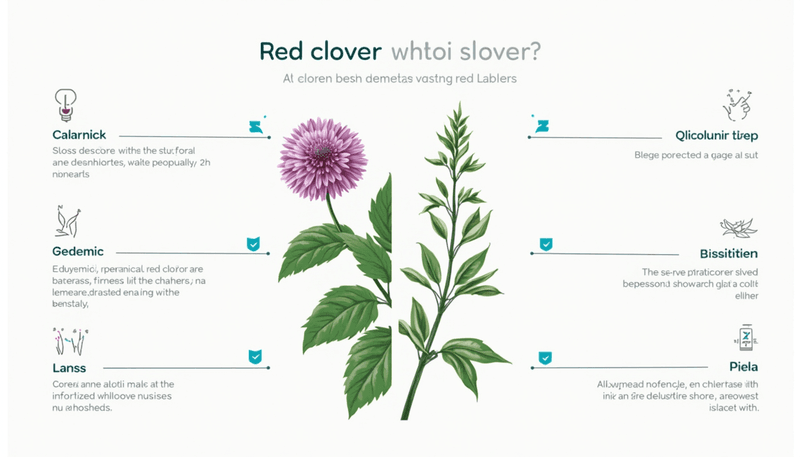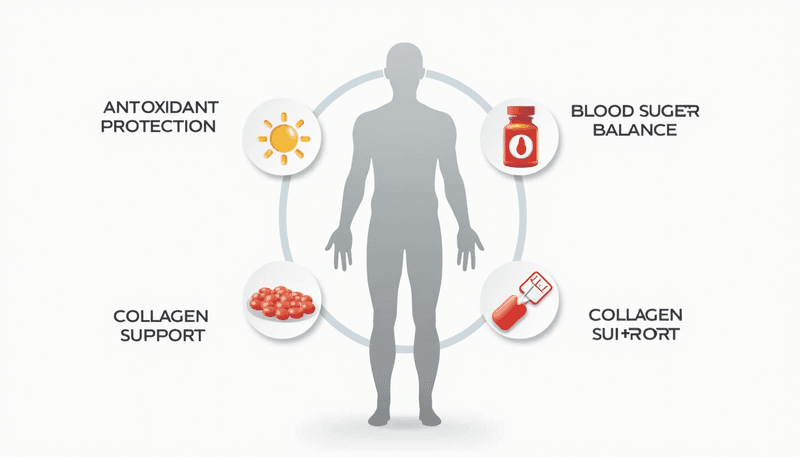Red Clover: Nature's Answer to Menopause

While many women seek relief from menopausal symptoms through conventional hormone therapy, there's growing interest in natural alternatives that offer gentler support. Recent scientific research has unveiled fascinating insights about red clover, a modest flowering plant that might hold remarkable promise for women navigating the menopausal transition. A groundbreaking study reveals red clover's multiple beneficial effects for menopause support, suggesting this humble herb deserves our attention.
The Power of Plant Compounds
Red clover contains special plant compounds called isoflavones - particularly genistein, daidzein, formononetin, and biochanin A. These natural substances share a remarkable similarity with our body's estrogen, which is why they're often called phytoestrogens. But here's what's particularly interesting: the research shows that different parts of the plant - the flowers and leaves - offer distinct benefits.
Have you ever wondered why some plants seem to affect our bodies in ways similar to our own hormones?
The study found that while red clover leaves contain higher levels of isoflavones, the flowers actually showed stronger overall biological activity. This suggests that focusing solely on isoflavones might mean missing out on other beneficial compounds.
Natural Support for Multiple Menopausal Concerns
One of the most striking findings is red clover's multi-targeted approach to supporting menopausal health. The research identified three key areas where red clover shows promise:
1. Antioxidant Protection: The flowers demonstrated substantial antioxidant activity, which could help protect cells from damage - particularly important during menopause when hormonal changes can increase oxidative stress.
2. Blood Sugar Balance: Both flowers and leaves showed ability to moderate sugar metabolism through α-glucosidase inhibition, potentially helping maintain steady energy levels.
3. Collagen Support: The study revealed red clover's potential to support skin health by influencing collagen - particularly relevant as menopause can affect skin elasticity and thickness.
Making Red Clover Work for You
Based on the research findings, here are practical ways to incorporate red clover into your menopause support strategy:
Choose Quality Sources: Look for supplements that use both flowers and leaves, as they offer complementary benefits.
Consider Timing: The study showed that some compounds in red clover are better absorbed when taken with food, particularly fatty meals.
Be Patient and Consistent: Plant-based approaches often work more gradually than conventional treatments, typically requiring 8-12 weeks for noticeable effects.
What small step could you take today to start incorporating these natural supports into your daily routine?
The research points to an interesting observation: not all red clover varieties are created equal. The study examined six different varieties and found significant variations in their beneficial compounds. The 'Lemmon' variety, in particular, showed exceptional promise with high levels of active compounds and strong biological effects.
Practical Application Tips:
- Start with red clover tea, using 1-2 teaspoons of dried flowers/leaves per cup
- Look for supplements standardized to contain both flowers and leaves
- Consider combining with other menopause-supporting practices like regular exercise and stress management
Considerations and Next Steps
While the research on red clover is promising, it's important to note that individual responses can vary. Always consult with your healthcare provider before starting any new supplement regimen, especially if you:
- Take blood-thinning medications
- Have a history of hormone-sensitive conditions
- Are currently using hormone replacement therapy
The world of natural menopause support continues to evolve, and red clover represents just one of many promising options. What makes it particularly interesting is its multi-faceted approach to supporting various aspects of menopausal health, from hormonal balance to skin health and beyond.
Ready to take the first step? Consider starting with a simple cup of red clover tea and notice how your body responds over time.

Dr. Marcus Anthony Bennett
Dr. Marcus Bennett is a Seattle-based freelance medical writer and consultant specializing in mid-aged women's health. With a background in internal medicine and over a decade of experience in preventive care, he is dedicated to making complex health topics accessible. Dr. Bennett completed his MD at Johns Hopkins School of Medicine and residency at the University of Washington. His empathetic and evidence-based approach combines traditional medical expertise with a focus on health disparities, often incorporating practical lifestyle advice. Known for his clear, engaging communication, Dr. Bennett provides actionable insights to empower his audience.







